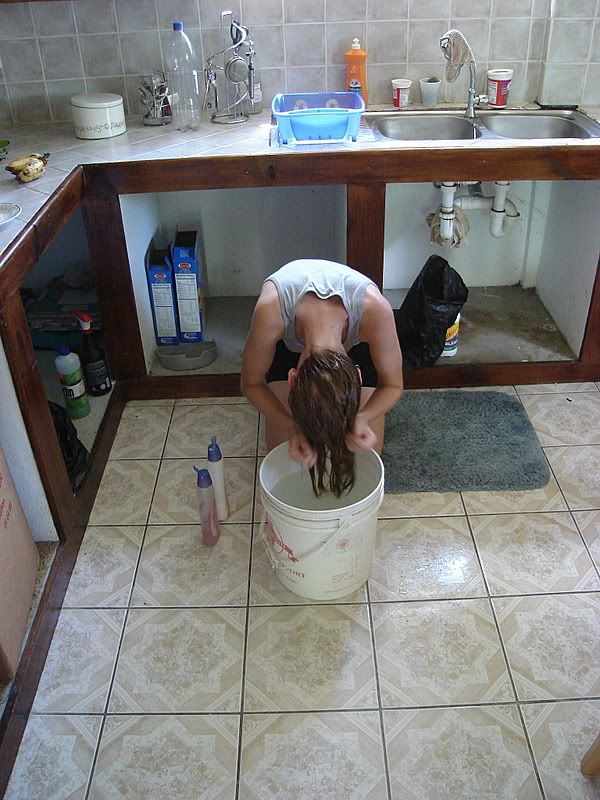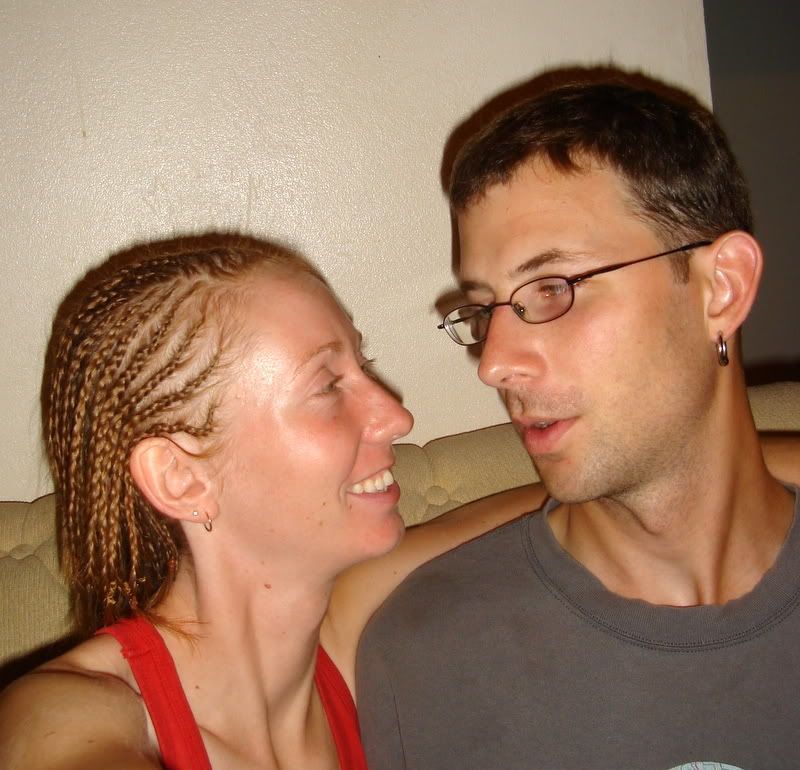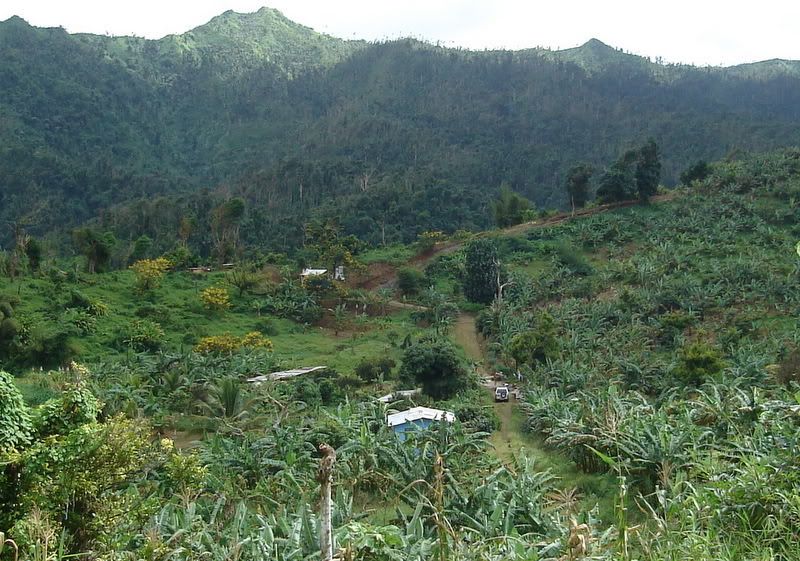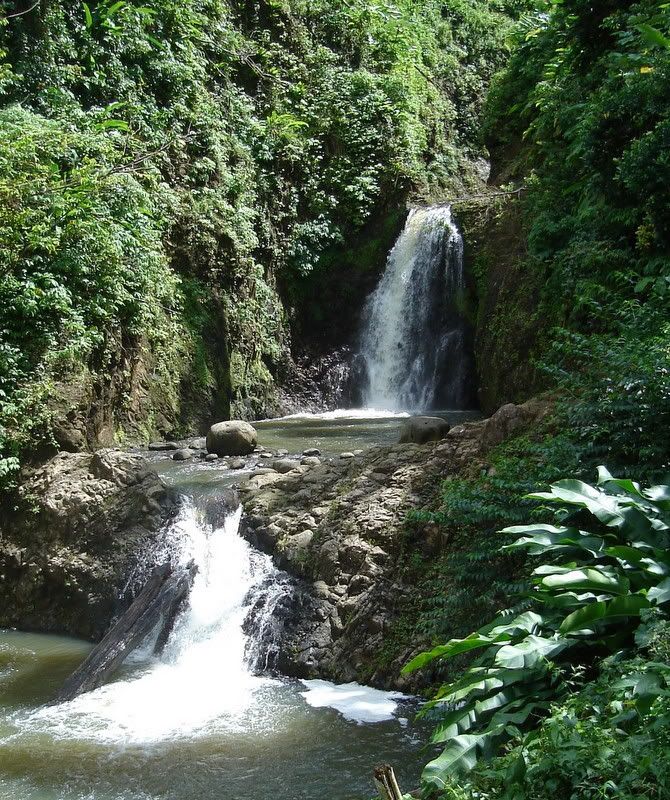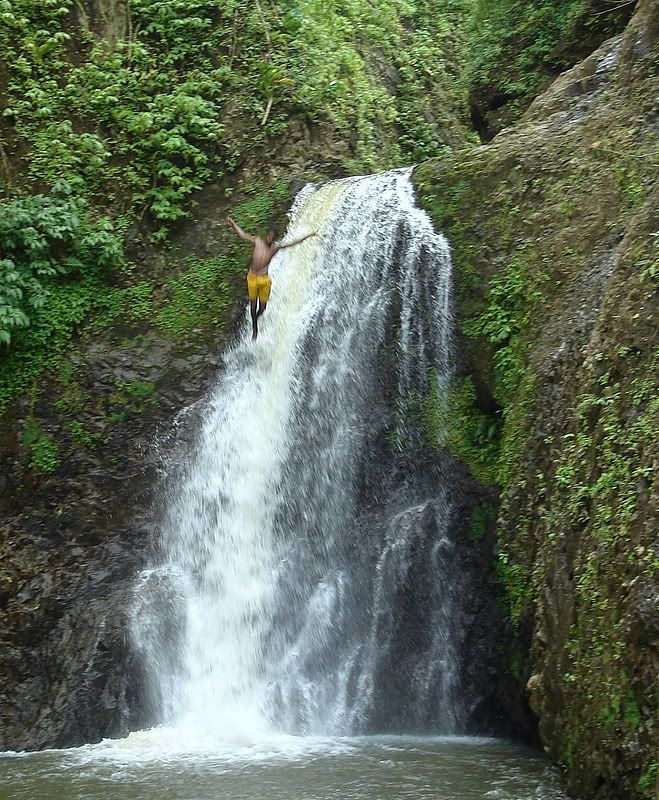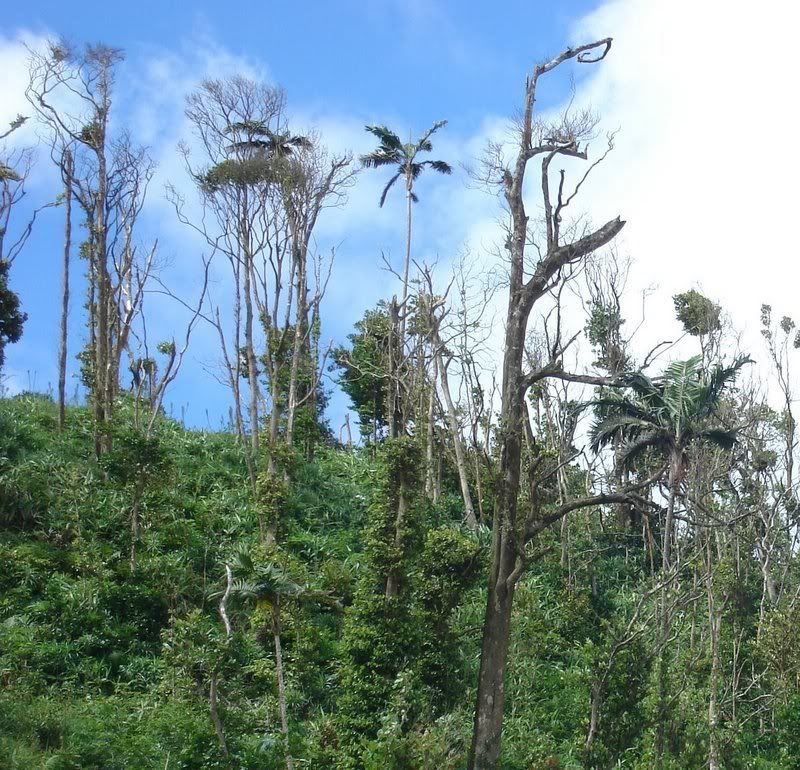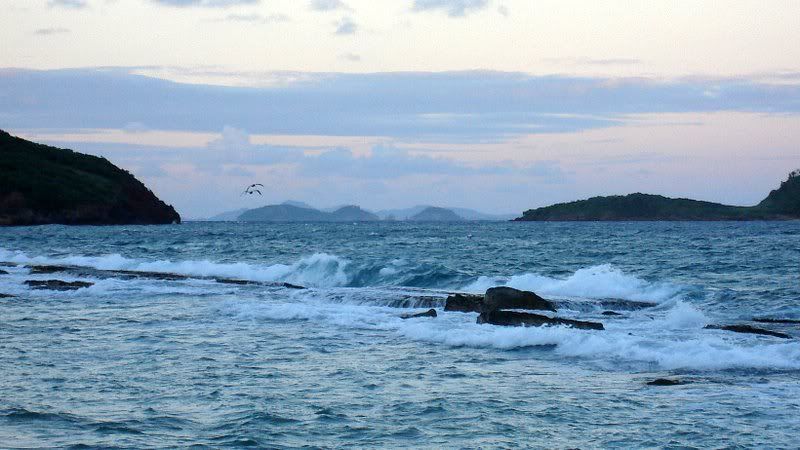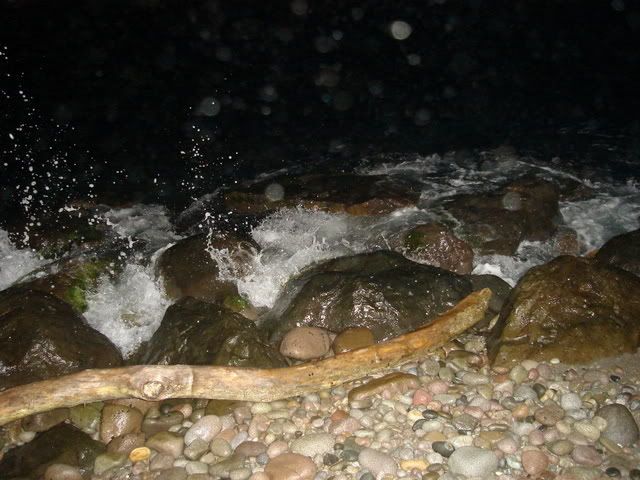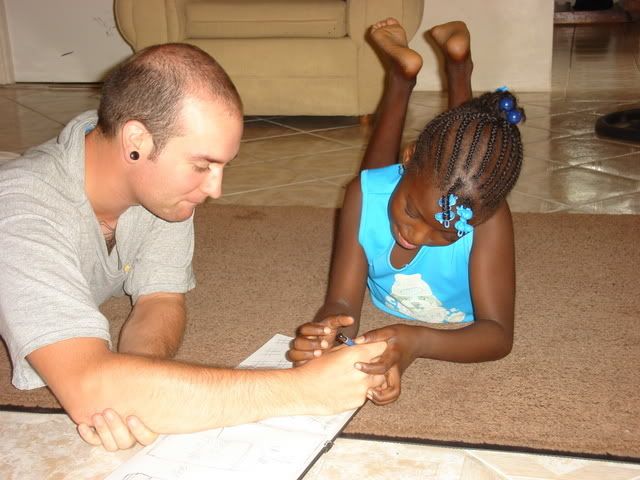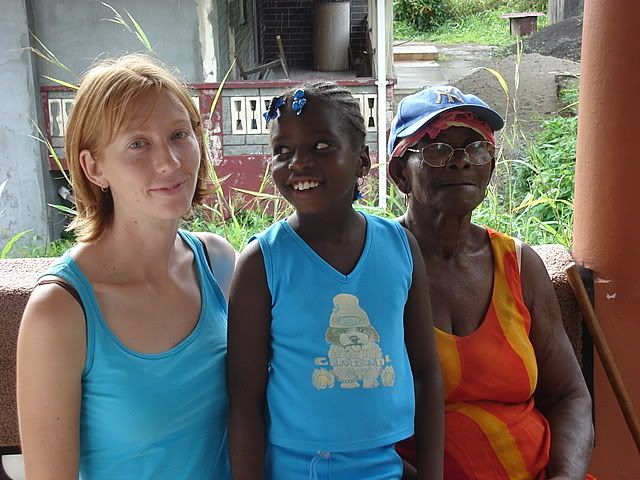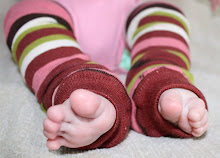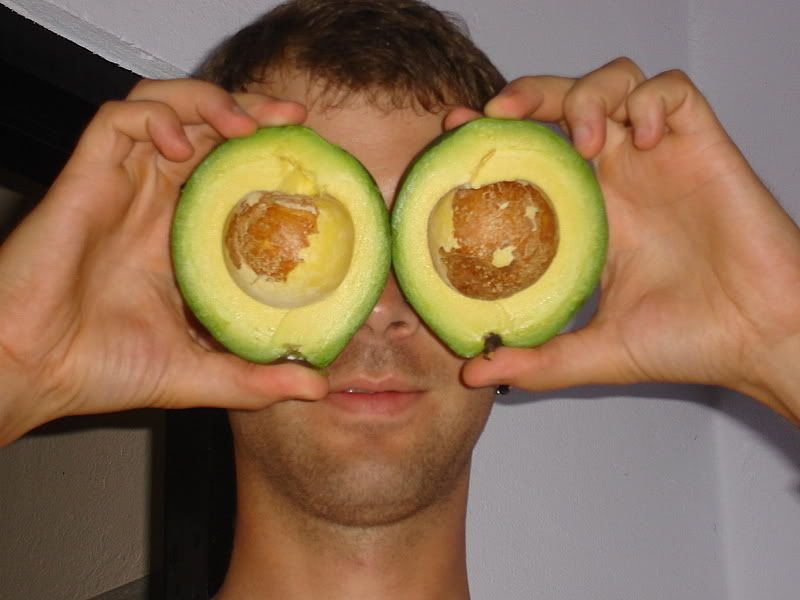
And the winner is.....................Lori Franz! You are correct. Bakanek is indeed the back of the neck of a chicken! Grenadians seem to think that this is hilarious when they mention it to us foreigners. Your prize is five awfully silly pictures to make you laugh. Ah, Lori laughing. I can hear it from here. :) (it is one of my favourite sounds!)
Look at the size of those avocados!!
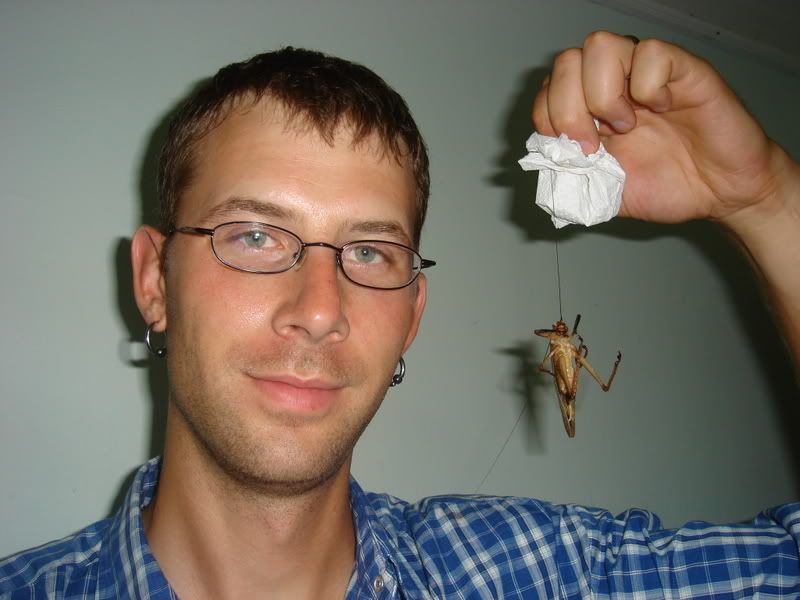
Almost as good as bakanek. Next time it goes in the oil down.
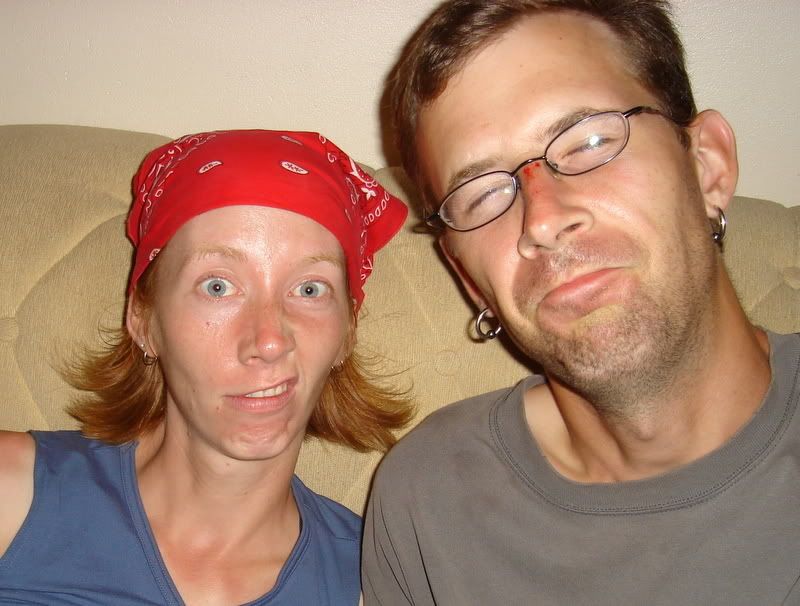
Hiking through the jungle does strange things to people! (Plus, can you all see the yellow remnants of steam down crab on Jason's chin?)
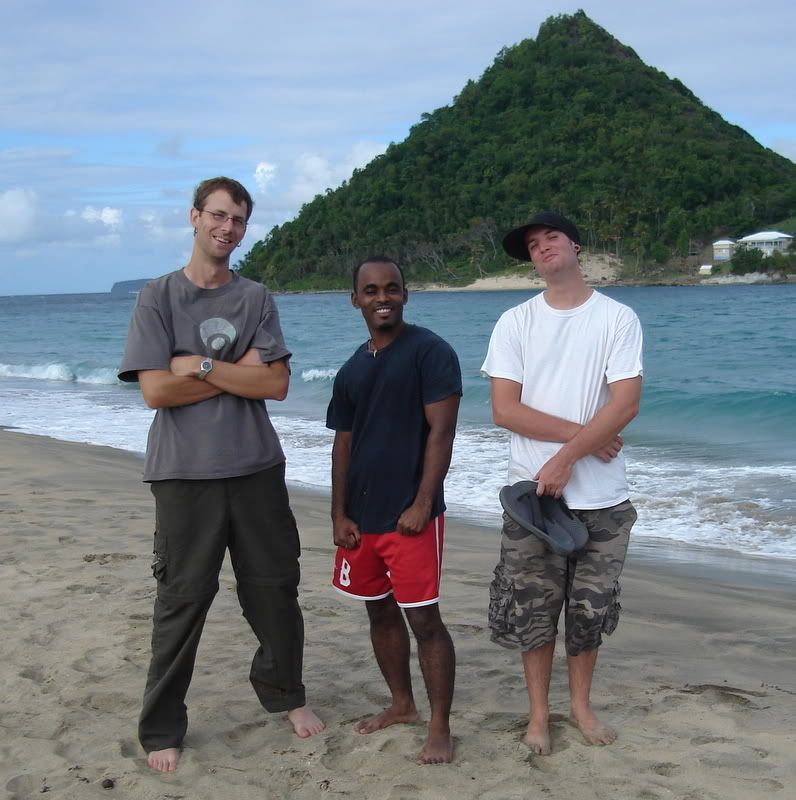
Posing in front of Sugarloaf Island off Levera Beach. Rumpus on the left, Malcolm (Short Man) is front and centre, with Drew (housemate) representing west side.
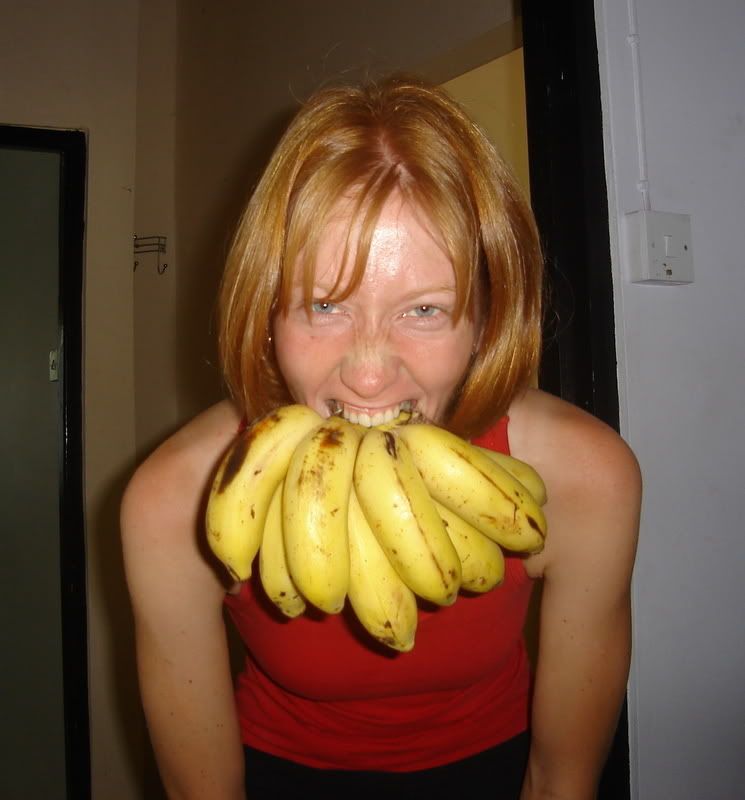
Do you really need an explanation? Let's have a contest for best caption! Place your best entries in our comments section.
I looked at our last few posts and realised that we haven’t been discussing any, or at least very little, of the work that we have had to do for GRENCODA. In truth, as indicated earlier, we have had to adjust to the significant change of pace that our volunteering has brought. But now, with over a month under our collective belts, we have begun to collect some projects and work assignments that will keep us busy for the next month or two. After waiting patiently since we got here, Kristy has work with the after-school program, tutoring students (usually Form Five or senior-level high school) in various subject areas. I believe that I outlined the subject areas in a previous blog entry and so I won’t remind everyone that I have been frantically trying to scrape the rust from my memories of high school math. Luckily, of the few students that have signed up for the after-school program, there has been little call for help with math. The after-school program is also calling Kristy over to a neighbouring community, Grand Roy, to tutor a number of younger students (between 5 and 10 5th graders, I believe) over there on Monday. Kristy has also been engaging here creative skills while compiling and assembling a photo journal for GRENCODA. This journal highlights some of the post-Ivan building projects that Johnson & Johnson sponsored through GRENCODA and ART (Association for Rural Transformation, another NGO). The general secretary of GRENCODA has been so impressed with Kristy’s work that she is promising more projects of a similar ilk. There is also talk of Kristy applying her creative skills to the GRENCODA website (grencoda.org, I think). It’s good to see her engaged in these creative projects, as I believe they are something at which she excels.
After much patient waiting on our parts, Andrew and I are to finally begin working with the Cocoa Rehabilitation Initiative this coming week. We have been paired with two extension officers from the Cocoa Farmers’ Association and will be making trips into the farming communities three times a week from now until Christmas. After the Christmas break we may resume our work with the Cocoa Initiative but the nature of our work may change due to the onset of the dry season. The first couple of weeks of this work will consist of us getting out into the field and learning about cocoa farming, maintenance and production. Some of our job duties will involve coordinating the transport of planting materials (cocoa and banana seedlings), fertilizers and mesh shade screens to the various farm sites. In addition to these duties we will be heading out to the Maribeau Propagation Station (on the west side of Grenada), a government-run nursery that provides the vast majority of plants for Grenada’s farmers. While they produce seedlings for nutmeg, cocoa and banana, there are an abundance of other plants available from produce and vegetable plants to fruit trees of a wide variety (mangos, breadfruit, citrus, star-fruit, golden apple, etc.). All of this work will keep Andrew and I busy for some time and I am looking forward to actually having some projects that carry a little responsibility with them, it makes me look forward to going to work in the morning.
Yesterday, we took to the day off and headed into St. George’s. A Grenadian contact that I had made while we were living in Canada kindly arranged a meeting for us with two people from the ARD (Agency for Reconstruction and Development, a government organisation) who are well-versed in Grenadian agricultural issues. I guess I should explain how I made the contact that enabled me to secure some time with government officials. Earlier in the summer, my mother, while reading one of the farming publications that she subscribes to had come across an article written by a person living in Grenada. The article described the positive effects, namely the opportunity to start over and diversify, of the devastation wrought by hurricane Ivan on the farming communities in Grenada. I emailed a letter to the editor of the publication, which they then forwarded to the writer of the article. The author (a Canadian, Manitoban actually, ex-pat that has been living in Grenada since 1988) responded quickly and with enthusiasm regarding my interest in the article. After exchanging a few emails we agree on making contact once Kristy and I had settled into our routines in Grenada. When I had made plans to visit the ARD headquarters, I had envisioned a quick tour of the facilities and maybe receiving a few pamphlets describing the agency’s mandate and programming. I didn’t think that I would have the opportunity to steal an hour of their time on the questions that Andrew and I had regarding agricultural policies and aggregate trends in Grenada. I think they were impressed (and a bit surprised) by an undergrad student who managed to finagle a meeting with them. Afterwards my contact (whose privacy I am respecting because she is a government employee and I didn’t ask if I could use her name on a publicly accessible blog) extended an invitation that we should head out to Grenville for a weekend some time to visit her and her husband and try their version of ‘oil down’, that wonderful Grenadian dish.
This is my first time dealing with what some travellers call the ‘community of ex-pats’ in foreign countries. I am struck by the impression that Canadians working abroad believe themselves to be bound in inextricable ways to other ex-pats, despite having little in common but their country of origin. I didn’t come to Grenada to find Canadians but at the same time, I promised myself before arriving here, that I would meet as many people as possible. I do feel, however, that there are more commonalities with our contact than just country of origin. She grew up on a farm in McGregor, Manitoba before moving to a small farming community 25 minutes north of Saskatoon. I still don’t know how she made the move to Grenada, (though I will certainly ask) but the farming connection is familiar and comforting. I look forward to visiting with them in the future.
After our meeting with ARD, we fulfilled one of the (selfish) reasons I had for coming to a tropical island for my practicum, we went to the beach. Before coming to Grenada, I had hoped that would be the way things would work out; work hard in the morning and head to the beach in afternoon. Needless to say I felt no shame in soaking up some rays, reading a good Russian novel, and playing in the gentle surf. The beach was very un-crowded and since there were no cruise ships in port, the beach vendors weren’t out in force either. I don’t begrudge these vendors their right to make a living but it can be tiring to politely, but firmly tell them, “No, thanks”, only to have their compadres approach us two minutes later. We used to give explanations, “No, thanks, we are living in Gouyave and won’t need souvenirs” but it didn’t seem to lessen their drive, so we changed tactics and became more assertive in our approach. Grenadians, by and large, seem to really appreciate a straight forward answer, without any fancy verbal dancing, and respect honesty. I believe that is something that is true in most of the world. It seems that as a consequence, the exchanges move quickly from the retail context to conversational.
As much fun as Grand Anse beach is by itself, I had a further goal in mind. There are four dive shops located along the beach and we had parked ourselves under a small shade tree in front of one of these shops. I went in and chatted up the people working behind the counter. Before coming to Grenada, Kristy and I had talked about the possibility of obtaining our open-water certificates for SCUBA diving but the costs are quite high. Most shops, with good reputations and qualified personnel, charge over $400 US for the three to four day course. It turns out that it pays in many ways to inhabit a tropical for longer than a few days. For local people (which we are considered by the dive shops) the cost of the certification drops significantly. Needless to say Kristy and I are quite excited about the possibility of obtaining our certification (at a discount) and exploring some of the reefs around Grenada. Our only trepidation is that neither of us has done something like this before and there is always the possibility of claustrophobia when wearing all that equipment. We are planning to take an exploratory class in a couple weeks and see how things progress from there. I know that SCUBA diving is not afforded by many Grenadians. I wanted to live as closely to the locals as possible when spending time here, but the opportunity to go diving in the Caribbean Sea is a luxury that we find ourselves willing to indulge. Besides, Kristy intentionally saved her tip money from the Heritage Village Restaurant with this express purpose in mind, so it doesn’t detract from our overall budget.
I guess I can say that we find ourselves, this weekend, looking forward to the coming weeks. We have work to do, we have recreational plans and some possible social activities and we are beginning to feel quite at home here. Now, if only our landlords could get the washing machine hooked up, we would smell better, too. ;)
Much Respect and Love,
Jason (and Kristy)
